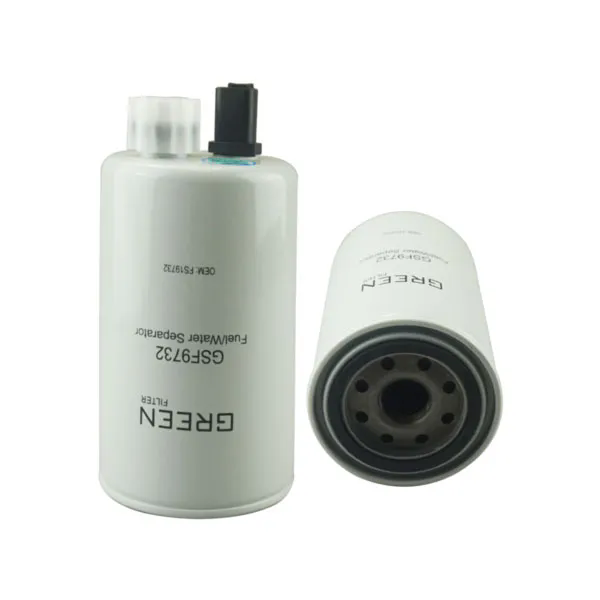Fuel Water Separator: Essential Protection for Your Engine
2024-09-20
In the world of fuel systems, few components are as critical to the longevity and performance of an engine as a fuel water separator. Whether you own a boat, truck, or industrial machinery, ensuring clean, water-free fuel is crucial for optimal performance. This blog will explore what a fuel water separator is, why it's important, how it works, and tips for selecting the right one for your needs.
What is a Fuel Water Separator?
A fuel water separator is a device designed to filter out water and other contaminants from fuel before it enters the engine. Water in fuel can cause significant damage to engines, leading to poor performance, corrosion, and even failure. This is especially important for diesel engines, which are more prone to water contamination due to condensation and other factors.
The separator typically consists of a filtration unit that traps water and impurities, ensuring that only clean fuel passes through to the engine. It’s commonly used in marine, automotive, agricultural, and industrial applications where fuel contamination is a risk.
Why is Water in Fuel a Problem?
Water contamination in fuel can occur for several reasons, such as condensation in the fuel tank, contaminated fuel sources, or improper storage. Once water enters the fuel system, it can lead to a range of issues:
- Corrosion: Water can corrode metal components in the fuel system, leading to rust and eventual system failure.
- Poor Combustion: Water in the fuel can disrupt the combustion process, resulting in reduced power, inefficiency, and excessive smoke.
- Bacterial Growth: Water in fuel can promote the growth of bacteria and fungi, which can clog fuel lines and filters, causing engine problems.
- Freezing: In cold climates, water in the fuel can freeze, blocking fuel flow and potentially causing serious damage.
To prevent these problems, a fuel water separator acts as a first line of defense by removing water and contaminants before they can cause harm to the engine.
How Does a Fuel Water Separator Work?
The basic function of a fuel water separator is to filter out water and other impurities from the fuel. It typically operates in two stages:
1. Filtration: Fuel enters the separator where it passes through a filter designed to trap larger particles such as dirt, debris, and rust. This initial filtration helps prevent these contaminants from reaching the engine.
2. Water Separation: As fuel flows through the separator, water, which is heavier than fuel, is pulled out of the fuel mixture and collected at the bottom of the separator. The separated water can then be drained manually or automatically, depending on the type of separator.
Some separators also include features like water sensors that alert the user when it's time to drain the water, ensuring the system remains free from contamination.
Benefits of Using a Fuel Water Separator
1. Engine Protection
The most significant benefit of a fuel water separator is the protection it offers to your engine. By preventing water and contaminants from reaching the engine, you can avoid costly repairs, extend engine life, and maintain consistent performance.
2. Improved Fuel Efficiency
Water and contaminants can interfere with the combustion process, leading to inefficient fuel burn. By ensuring that only clean fuel reaches the engine, a separator helps improve fuel efficiency, which can result in better mileage and lower operational costs.
3. Reduced Maintenance
Without a separator, water and debris can clog fuel filters and injectors, leading to frequent maintenance and part replacements. A fuel water separator reduces the frequency of such issues, cutting down on maintenance costs and downtime.
4. Environmental Protection
Separators not only protect your engine but also help reduce harmful emissions caused by incomplete combustion due to fuel contamination. Cleaner fuel means a cleaner burn, which is better for the environment.
Types of Fuel Water Separators
There are several types of fuel water separators, each designed for different applications:
- Spin-On Fuel Water Separators: These are common in vehicles and boats, and they feature a replaceable spin-on filter element. They are easy to maintain and often include a clear bowl for monitoring water levels.
- Inline Fuel Water Separators: Installed directly in the fuel line, these separators are compact and can be used in a variety of settings, including small engines and machinery.
- Marine Fuel Water Separators: Specifically designed for use in boats, these separators are built to withstand harsh marine environments and are typically made from corrosion-resistant materials.
- Diesel Fuel Water Separators: Diesel engines are particularly vulnerable to water contamination, making diesel-specific separators a crucial component in trucks, agricultural equipment, and industrial machinery.
How to Choose the Right Fuel Water Separator
When selecting a fuel water separator, consider the following factors:
1. Engine Type
Different engines have different requirements, so make sure to choose a separator that is compatible with your engine type, whether it's for a diesel engine, gasoline engine, or marine engine.
2. Flow Rate
The flow rate of the separator should match or exceed the fuel flow rate of your engine. A separator that can't handle your engine's fuel flow will cause inefficiency or even damage.
3. Filtration Level
Look for a separator that offers the right level of filtration for your application. Some models are designed to trap finer particles, which can be important in environments with higher levels of fuel contamination.
4. Drain System
Some fuel water separators come with a manual drain system, while others have automatic draining. If you're using the separator in an environment where you can't frequently monitor it, an automatic system might be more convenient.
5. Material Durability
If you’re using a separator in a marine or industrial environment, durability is key. Look for models made from corrosion-resistant materials like stainless steel or reinforced plastics.
Maintenance Tips for Fuel Water Separators
To keep your fuel water separator working efficiently, regular maintenance is essential. Here are some tips:
- Check for Water Accumulation: Regularly inspect the separator for water buildup and drain it as needed.
- Replace Filters: Follow the manufacturer’s recommendations for replacing the filter elements. Over time, filters can become clogged and less effective.
- Monitor Water Sensors: If your separator has a water sensor, ensure it’s functioning properly. This will alert you when it’s time to drain the water.
- Inspect Seals and O-Rings: Over time, seals can wear down and cause leaks. Regularly inspect and replace these components as necessary.
Conclusion
A fuel water separator is an essential tool for maintaining the health and performance of your engine. Whether you operate a vehicle, boat, or industrial machine, keeping water and contaminants out of your fuel system is critical. By investing in the right separator and maintaining it properly, you can avoid costly engine repairs, improve fuel efficiency, and extend the lifespan of your equipment.
If you’re looking to protect your engine and ensure peak performance, consider installing a fuel water separator today. It’s a small investment that pays off with big rewards in the long run!



